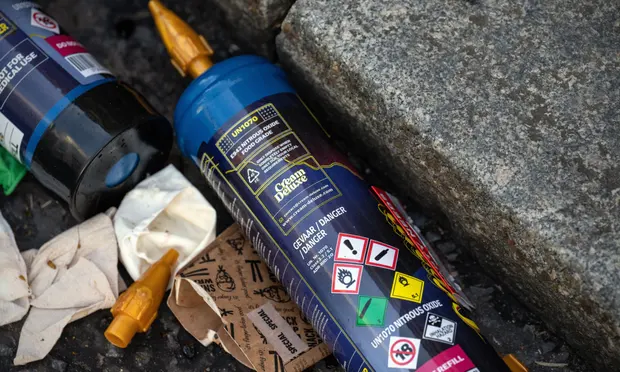The sale of nitrous oxide, or laughing gas, to the public will be banned and the police will be given enhanced drug-testing powers as part of Rishi Sunak’s attempt to crack down on antisocial behaviour “with urgency”.
The levelling up secretary, Michael Gove, said the proposals would stop parks being turned into drug-taking arenas, and would help ministers stamp out antisocial behaviour.
The ban comes a month after the independent Advisory Council on the Misuse of Drugs (ACMD) warned against one and said it would be disproportionate with the level of harm associated with nitrous oxide. It said such control could create “significant burdens” for legitimate uses of the substance.
Experts have criticised the “same old tired drug policy” from the Conservatives, insisting the ban will not stop young people from using it.
“No single recommendation on its own is likely to be sufficient to successfully reduce the harms associated with nitrous oxide use,” the ACMD concluded in its report.
Current legislation bans the knowing or reckless supply of nitrous oxide for inhalation, with dealers facing up to seven years in jail. The drug is typically released into balloons from small silver canisters and then inhaled.
Ignoring the commission’s advice, the prime minister has announced plans to ban laughing gas in an antisocial behaviour action plan that will launch new “hotspot police” to cover 16 areas across England and Wales with the highest rates of disorder.
Steve Rolles, a senior policy analyst at the Transform Drug Policy Foundation, said: “This government appears determined to double down on the political theatre of ‘get tough’ drug policing as part of its antisocial behaviour crackdown. But criminalising possession of nitrous oxide will increase health and social harms associated with it, creating new costs across the criminal justice system.
“To reduce risks, this government should sensibly direct resources towards risk education for vulnerable groups, and restrict sales of the bigger nitrous canisters that have no legitimate use. To reduce litter, it could adopt a recycling deposit scheme for nitrous canisters.”



